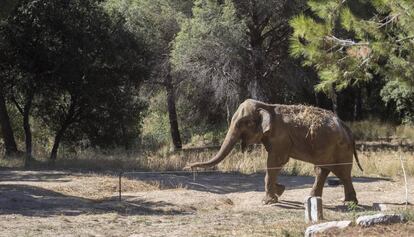Meet Dumba, the Catalan elephant
Activists claim that the animal is being kept in poor living conditions by its British handlers, something that they reject outright

A campaign launched by Spanish animal rights organization FAADA is denouncing the “awful conditions” of an elephant that is being kept on a farm in Caldes de Montbui, in the northeastern region of Catalonia. The caretakers of the animal, however, deny the accusations. They maintain that the animal, named Dumba, has more than sufficient space and that all her needs are being attended to.
“We’re very fortunate to be sharing our lives with Dumba,” says Yvonne Kludsky, a Briton who has lived and worked with the 38-year-old Asian elephant for three decades. The elephant is one of the protagonists of The Kludsky Family act, which the owners offer up for movies, commercials and other events. The animal’s caretaker and trainer argues that “Dumba enjoys a full life and is able to discover different places through her work, which is important when it comes to keeping her challenged and stimulated.”
Kludsky, who grew up around animals, comes from a family with links to the circus, and defines her relationship with Dumba as “close, familiar, and loving.” She says that the elephant’s health has been supervised since 1982 by the same veterinarian, one who specializes in exotic animals, and that Dumba has everything an animal of her type could need. “Living together with animals is wonderful and interesting, but it’s a demanding job, and routine is essential for them.”
Dumba enjoys a full life and is able to discover different places through her work Owner and handler Yvonne Kludsky
However, FAADA claims that Dumba is living in “awful conditions,” according to a statement on its website, noting that the animal’s living space is barely 100 square meters. According to the statement, FAADA informed the regional government of Catalonia of the case in 2010 and an inspection was ordered. In 2014, the couple caring for the elephant was pressured to meet a series of corrective measures and recommendations for Dumba’s well-being.
Kludsky has responded claiming that the animal’s enclosure is in fact 550 square meters, and that Dumba also has access to a 7,741-square-meter plot of land full of trees and vegetation, which she can walk around when the caretakers accompany her. Kludsky and her husband George oversee Dumba’s feeding and cleaning, as well as taking care of things such as her nails and skin.
“They have a right to their opinion, but they should get better informed,” says Kludsky of FAADA’s intervention, which has set into motion a campaign to gather signatures on Change.org after determining that “changes have not been made” to the elephant’s living space. Catalonian government sources explain that “having an elephant in and of itself isn’t illegal.” Currently, Spain’s Service of Biodiversity and Animal Protection, as well as the Department of Territory and Sustainability, are waiting to verify if the owners have complied with the obligatory security adjustments, including the placement of “Dangerous Animal” signs and a 2.40-meter-high fence. “We’ve already hung the signs and erected an exterior fence that surrounds the estate, but we’re in the process of putting up the new fence,” says Kludsky, adding that they hold all the necessary paperwork to keep Dumba.
FAADA’s statement reports that Dumba “spends over half the year in circuses across Europe,” and that “she’s forced to train constantly with her handler,” which has resulted in notable weight loss. Kludsky denies the accusations and attributes the weight loss to an illness.
Sign up for our newsletter
EL PAÍS English Edition has launched a weekly newsletter. Sign up today to receive a selection of our best stories in your inbox every Saturday morning. For full details about how to subscribe, click here
Kludksy recognizes that the pressure of animal rights groups has produced benefits for animals in recent years, but she argues that “in this day and age, people have lost their common sense. People are more aware, which is good, but rather than banning animals from the circus, we should be improving regulations. When children come to see her, they’re given a short lesson about elephants that has nothing to do with turning a profit. The goal is to teach them that they have to love, respect and care for the animals, since in their home countries there are serious problems, such as the African elephant being hunted for its ivory.”
Meanwhile, Dumba lifts some grass to her mouth with her trunk. “A happy elephant always needs to be moving – it’s when it’s still that something happens to it. And she’s always moving,” says Kludsky. “She’s like a daughter to us,” her husband adds.
English version by Allison Light.
Tu suscripción se está usando en otro dispositivo
¿Quieres añadir otro usuario a tu suscripción?
Si continúas leyendo en este dispositivo, no se podrá leer en el otro.
FlechaTu suscripción se está usando en otro dispositivo y solo puedes acceder a EL PAÍS desde un dispositivo a la vez.
Si quieres compartir tu cuenta, cambia tu suscripción a la modalidad Premium, así podrás añadir otro usuario. Cada uno accederá con su propia cuenta de email, lo que os permitirá personalizar vuestra experiencia en EL PAÍS.
¿Tienes una suscripción de empresa? Accede aquí para contratar más cuentas.
En el caso de no saber quién está usando tu cuenta, te recomendamos cambiar tu contraseña aquí.
Si decides continuar compartiendo tu cuenta, este mensaje se mostrará en tu dispositivo y en el de la otra persona que está usando tu cuenta de forma indefinida, afectando a tu experiencia de lectura. Puedes consultar aquí los términos y condiciones de la suscripción digital.








































